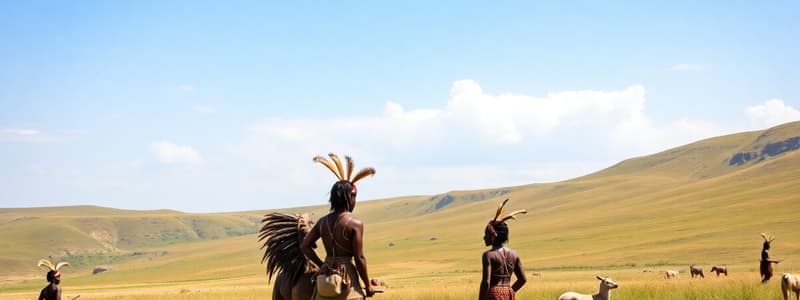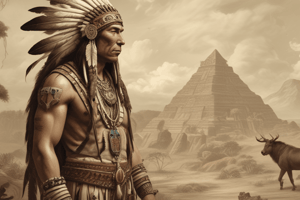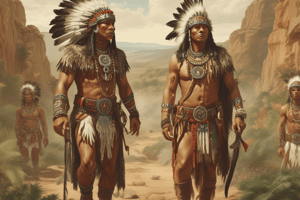Podcast
Questions and Answers
Match the following Native American groups with their primary characteristics:
Match the following Native American groups with their primary characteristics:
Iroquois = Villages built around maize cultivation Cahokia = Built giant mounds near St. Louis Algonquians = Hunting and fishing with three sister farming Natives of Great Plains = Bison hunting and use of horses
Match the European historical periods with their defining features:
Match the European historical periods with their defining features:
Middle Ages = Organized by social hierarchy and Christian majority Crusades = Attempt to reclaim Jerusalem from Muslims Renaissance = Cultural awakening and advancements in exploration Reformation = Started with Martin Luther's 95 theses
Match the crops introduced to Europe from America during the Columbian Exchange:
Match the crops introduced to Europe from America during the Columbian Exchange:
Potatoes = Led to an increase in European population Maize = An important staple crop Tomatoes = Gained popularity in European cuisine Cacao = Source of chocolate
Match the following explorers or historical figures to their contributions:
Match the following explorers or historical figures to their contributions:
Signup and view all the answers
Match the reasons for European exploration:
Match the reasons for European exploration:
Signup and view all the answers
Match the following advancements from the Renaissance to their descriptions:
Match the following advancements from the Renaissance to their descriptions:
Signup and view all the answers
Match the societal changes among Native Americans before European contact:
Match the societal changes among Native Americans before European contact:
Signup and view all the answers
Match the diseases introduced to America from Europe during the Columbian Exchange:
Match the diseases introduced to America from Europe during the Columbian Exchange:
Signup and view all the answers
Match the following events with their associated presidents:
Match the following events with their associated presidents:
Signup and view all the answers
Match the following treaties with their outcomes:
Match the following treaties with their outcomes:
Signup and view all the answers
Match the following Supreme Court cases with their significance:
Match the following Supreme Court cases with their significance:
Signup and view all the answers
Match the following political concepts with their descriptions:
Match the following political concepts with their descriptions:
Signup and view all the answers
Match the following individuals with their key roles:
Match the following individuals with their key roles:
Signup and view all the answers
Match the following events with their notable consequences:
Match the following events with their notable consequences:
Signup and view all the answers
Match the following acts with their effects:
Match the following acts with their effects:
Signup and view all the answers
Match the following concepts with their associated ideological movements:
Match the following concepts with their associated ideological movements:
Signup and view all the answers
Match the following treaties with the nations involved:
Match the following treaties with the nations involved:
Signup and view all the answers
Match the following conflicts with their causes:
Match the following conflicts with their causes:
Signup and view all the answers
Match the following acts with their descriptions:
Match the following acts with their descriptions:
Signup and view all the answers
Match the following events with their historical significance:
Match the following events with their historical significance:
Signup and view all the answers
Match the following individuals with their contributions:
Match the following individuals with their contributions:
Signup and view all the answers
Match the following documents with their purposes:
Match the following documents with their purposes:
Signup and view all the answers
Match the following leaders with their roles during the Revolutionary War:
Match the following leaders with their roles during the Revolutionary War:
Signup and view all the answers
Match the following compromises with their content:
Match the following compromises with their content:
Signup and view all the answers
Match the following revolutionary concepts with their definitions:
Match the following revolutionary concepts with their definitions:
Signup and view all the answers
Match the following rebellions with their causes:
Match the following rebellions with their causes:
Signup and view all the answers
Match the following locations with their historical events:
Match the following locations with their historical events:
Signup and view all the answers
Match the following groups with their positions:
Match the following groups with their positions:
Signup and view all the answers
Match the following women with their contributions:
Match the following women with their contributions:
Signup and view all the answers
Match the following events with their consequences:
Match the following events with their consequences:
Signup and view all the answers
Match the following figures with their contributions:
Match the following figures with their contributions:
Signup and view all the answers
Match the following colonies with their characteristics:
Match the following colonies with their characteristics:
Signup and view all the answers
Match the following terms with their definitions:
Match the following terms with their definitions:
Signup and view all the answers
Match the following explorers with their achievements:
Match the following explorers with their achievements:
Signup and view all the answers
Match the following economic activities with their respective regions:
Match the following economic activities with their respective regions:
Signup and view all the answers
Match the following acts or policies with their purposes:
Match the following acts or policies with their purposes:
Signup and view all the answers
Match the following concepts with their impacts:
Match the following concepts with their impacts:
Signup and view all the answers
Match the following agricultural products with their significance:
Match the following agricultural products with their significance:
Signup and view all the answers
Match the following groups with their beliefs or practices:
Match the following groups with their beliefs or practices:
Signup and view all the answers
Match the following historical events with their centuries:
Match the following historical events with their centuries:
Signup and view all the answers
Match the following Native American tribes with their locations or actions:
Match the following Native American tribes with their locations or actions:
Signup and view all the answers
Match the following colonial assemblies with their features:
Match the following colonial assemblies with their features:
Signup and view all the answers
Match the following social systems with their characteristics:
Match the following social systems with their characteristics:
Signup and view all the answers
Match the following Revolts and Movements with their effects:
Match the following Revolts and Movements with their effects:
Signup and view all the answers
Study Notes
Time Period 1: Pre-Columbian and Early European Contact
-
Beringia: Land bridge connecting Siberia and North America, enabling early human migration.
-
American Indian Advancements: Complex societies existed across North America before European contact, demonstrating diverse adaptations.
- Maize Cultivation: Corn cultivation led to increased population and settled villages. Irrigation systems developed in the Southwest (Pueblos).
- Hunting and Gathering: Less reliance on hunting and gathering in agricultural societies.
- Permanent Villages: Development of permanent settlements due to agriculture.
- Diverse Groups: Natives across Great Plains, Great Basin (bison, sheep, hunting), Northeast (mixed hunting/gathering and agriculture, permanent villages – Iroquois), Mississippi River Valley (Cahokia – giant mounds), and Atlantic Seaboard (Algonquians – three sister farming).
-
European Culture:
- Middle Ages: Small villages, Christian majority, strict social hierarchy. Merchants gained prominence.
- Crusades: Efforts to regain the Holy Land from Muslims; led to trade route openings and weakened nobility.
- Reformation: Religious upheaval led by Martin Luther and others causing religious conflicts.
- Renaissance: Cultural rebirth emphasizing art, learning, and invention (movable type, caravel ships, compass).
-
Christopher Columbus: Sailed west to India in 1492, landing in the West Indies.
-
European Exploration Motives: "God, Gold, and Glory" – religious conversion, wealth seeking, and national prestige.
-
Columbian Exchange: Exchange of crops, diseases, people, and ideas between Europe and the Americas.
- Americas to Europe: Potatoes, maize leading to population growth.
- Europe to Americas: Horses, guns, European diseases decimating native populations.
- Declining Native Pop: Diseases severely reduced native American populations.
-
Encomienda System: Spanish land grant system justifying native enslavement under Christianity.
-
Bartolomé de las Casas: Advocated for native rights, contributing to the decline of the encomienda system.
-
European Exploration and Conquest:
- Conquistadors: Hernán Cortés conquered the Aztec Empire, Francisco Pizarro conquered the Inca Empire.
- Spanish Exploration: Spanish colonization impacted vast areas, causing native population decline. New animals and crops (horses, wheat, rice, sugar).
- Spanish Colonization: Intermarriage with natives and Africans, royal officials, caste system. Economic focus on precious metals (gold, silver) and plantations (sugarcane).
- Spanish Interactions with Natives: Considered natives uncivilized, enforced encomienda system, and aimed to convert to Christianity.
-
Portugal Colonization: Treaty of Tordesillas divided newly discovered lands between Spain and Portugal.
-
French Colonization: Samuel de Champlain founded Quebec in 1608, focused on friendly trade relationships, fur trade, and limited land acquisition.
-
Dutch Colonization: Henry Hudson reached New York in 1609, establishing trade posts.
-
Pueblo Revolt (Pope's Rebellion): Native American revolt challenging Spanish suppression of native religious practices. Spanish became more accommodating to native culture.
Time Period 2: British Colonization and Growth
-
Mercantilism: Economic policy focused on maximizing profit for the mother country (favorable balance of trade, more exports, fewer imports).
-
British Colonization:
- Reasons for Colonization: Rivalry with Spain (defeat of the Spanish Armada), seeking resources (gold, silver), reducing unemployment, primogeniture system. Puritan emigration seeking religious freedom.
-
Colonies:
-
Jamestown: First successful English colony; aimed to gain wealth.
- John Smith's "work or starve" maxim
- John Rolfe's tobacco success
- Headright system: land grants for settlers
- Indentured servants
- Plymouth: Founded by separatists (Pilgrims) seeking religious freedom. Mayflower Compact.
- Massachusetts Bay Colony: Founded by non-separatist Puritans; "City upon a hill" ideal; limited democracy (church membership requirement).
- Roger Williams: Advocated for separation of church and state, founded Rhode Island.
- Anne Hutchinson: Challenged Puritan theology, banished to Rhode Island.
- Chesapeake Bay Colonies: Tobacco and fishing economy; Maryland (Catholic refuge), Act of Toleration).
- Pennsylvania: Founded by Quakers providing religious freedom - Quakers: Pacifist religious group
- Connecticut: Fundamental Orders (first written constitution)
- Georgia: Refuge for debtors and a buffer against Spanish Florida.
-
Jamestown: First successful English colony; aimed to gain wealth.
-
British Colonization:
-
Characteristics of British Colonies:
- New England Colonies: Mixed economy, small towns, family farms, subsistence farming. Slightly higher life expectancy, slavery existed.
- Middle Colonies: Cereal crops (wheat, barley), ship building. Also some forms of small scale slavery and indentured serviitude
- Southern Colonies: Warm climate, cash crops (tobacco, rice, indigo), large plantations, dependence on enslaved labor.
-
Triangular Trade: Trade network between Europe, Africa, and the Americas, involving enslaved Africans.
-
Navigation Acts: British laws regulating colonial trade, forcing colonies to trade preferentially with Britain.
-
Metacom/King Philip's War: Conflict between British colonists and Native Americans in New England.
-
Bacon's Rebellion: Colonial rebellion in Virginia against Governor Berkeley's policies towards natives. Led to increased use of enslaved labor.
-
Salem Witch Trials: Series of accusations and executions in Massachusetts.
-
First Great Awakening: Religious revival emphasizing individual faith, sparking social and political change.
- Jonathan Edwards: Key figure in the First Great Awakening, known for "Sinners in the Hands of an Angry God".
- George Whitefield: Minister and orator from England who influenced the First Great Awakening.
Time Period 3: Towards Revolution
-
French and Indian War:
- Causes: Territorial disputes in North America.
- Albany Plan of Union: Rejected plan for colonial government to improve defense.
- Key Figures: William Pitt, General James Wolfe, George Washington, General Braddock.
- Outcome: France loses almost all North American territory; British gain Canadian region, lands east of Mississippi; Spain gains western territories.
- End of Salutary Neglect: British attempt to assert imperial authority after the war.
-
Pontiac's Rebellion: Native American uprising against British encroachment following the French and Indian War. Led to the Proclamation Act of 1763 prohibiting westward expansion.
-
Taxation and Resistance:
- Sugar Act, Stamp Act, Currency Act, Quartering Act: British taxes and regulations, sparking colonial resistance.
- Sons/Daughters of Liberty: Colonial resistance groups.
- Stamp Act Congress: Colonial response to the Stamp Act; asserted colonial right to be taxed only by colonial representatives.
- Colonial Boycott: Organized protests against British goods.
- Committees of Correspondence: Organized communication network among the colonies.
- Townshend Acts: Taxes on various goods; led to colonial protests.
- Boston Massacre: Violent confrontation between British troops and colonists.
- Boston Tea Party: Protest against the Tea Act.
- Intolerable Acts (Coercive Acts): Punitive measures imposed by the British following the Boston Tea Party.
- First Continental Congress: Meeting of colonial delegates to discuss grievances.
-
Road to Revolution:
- Lexington and Concord: First armed conflict between British and colonists.
- Second Continental Congress: Formation of a Continental Army, leadership by George Washington.
- Loyalists vs. Patriots: Colonists divided over independence.
- Common Sense: Pamphlet by Thomas Paine advocating for independence.
- Declaration of Independence: Formal declaration of American independence.
-
Revolutionary War Key Battles: Bunker Hill, Long Island, Trenton, Valley Forge, Saratoga, Yorktown.
-
Revolutionary War Outcomes:
- Treaty of Paris: American independence recognized.
- Separation of Church and State: New ideals emerged
- Republican Motherhood: Women and their roles in society changed.
- Revolutions Across the World: Connections and cross-influence among global movements for freedom and independence.
Time Period 4: Constitutional Era and Early Republic
-
Articles of Confederation: First US government; weak central authority, no executive and judicial branches, difficulties with interstate trade, taxation.
-
Northwest Ordinance: Established process for admitting new states and prohibiting slavery in the Northwest Territory. Showcases a shift in ideals about slavery.
-
Shay's Rebellion: Farmer's uprising highlighting weaknesses of the Articles of Confederation, prompting calls for a stronger central government.
-
Constitutional Convention: Drafting of the US Constitution.
-
Key Debates: Virginia Plan, New Jersey Plan, Great Compromise, 3/5 Compromise
-
Constitution: Foundation of the US government; established principles of limited government, federalism, and separation of powers.
-
Federalists vs. Anti-Federalists: Debate on the necessity and structure of the Constitution.
-
Bill of Rights: First 10 amendments ensuring individual rights, limiting federal power.
-
Early Presidencies (Washington, Adams, Jefferson, Madison, Monroe):
- Washington: 2-term precedent, Cabinet formation, Whiskey Rebellion.
- Adams: XYZ Affair, Alien and Sedition Acts, Virginia and Kentucky Resolutions.
- Jefferson: Louisiana Purchase, Embargo Act, War of 1812.
- Madison: War of 1812, Hartford Convention.
- Monroe: Monroe Doctrine, Missouri Compromise, acquisition of Florida.
- John Quincy Adams: Corrupt Bargain (allegations of a political deal)
- Andrew Jackson: Spoils System.
-
Important Supreme Court Cases: Marbury v. Madison, McCulloch v. Maryland, Gibbons v. Ogden (Judicial Review, federal supremacy over states).
Studying That Suits You
Use AI to generate personalized quizzes and flashcards to suit your learning preferences.
Description
Explore the advancements of American Indian societies before European contact and the significant cultural shifts during early interactions. This quiz covers the Beringia land bridge, agricultural developments, and diverse Native American groups. Delve into how these elements shaped early North American history.




